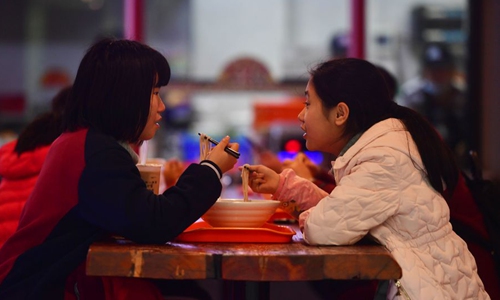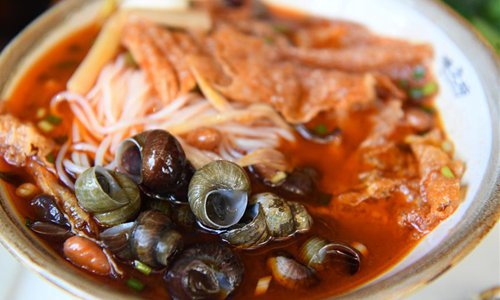
People eat river snail rice noodles at a restaurant in Liuzhou, south China's Guangxi Zhuang Autonomous Region, Jan. 2, 2020. (Xinhua/Huang Xiaobang)
This Tuesday seemed to be a day dedicated to luosifen rice noodles, with many Chinese netizens posting photos of the dish and sharing cooking tips and "secret recipes" on social media platforms.
Luosifen, a local specialty of Liuzhou, South China's Guangxi Zhuang Autonomous Region, was just one of a number of local Chinese delicacies that shot to fame after getting the thumbs-up from Chinese President Xi Jinping.
Xi visited a food-processing zone for luosifen rice noodles during his inspection of Liuzhou on Monday.
Xi said that it's not an easy task to develop the small rice noodle business into such a large industry.
Luosifen, also known as river snail rice noodles, is a dish that's famous for its distinct, pungent odor. The once obscure street food is now one of Liuzhou's pillar industries, with sales reaching 11 billion yuan ($1.7 billion) in 2020, and it became a national favorite for many during the COVID-19 epidemic.
On Tuesday, topics related to luosifen rice noodles again became top-trending items on Sina Weibo. One of the hashtags, Liuzhou luosifen sold to 20 countries and regions, had attracted more than 160 million views by Tuesday afternoon.
More than 30,000 participants out of 56,000 in an online poll by China News Service on Tuesday morning said they loved luosifen, and would miss it dearly if they did not have it for several days.

A bowl of river snail rice noodles is served at a restaurant in Liuzhou, south China's Guangxi Zhuang Autonomous Region, Sept. 20, 2018. The harvest season of river snails in Liuzhou has begun. In recent years, the promotion of river snail rice noodles benefits over 4,500 impoverished households in Liuzhou. (Xinhua/Li Hanchi)
Another category of dishes that gained popularity in recent years are Shaxian snacks, a street food from Shaxian, East China's Fujian Province. They can now be seen in chain restaurants, offering pork wontons, peanut sauce noodles and other local delicacies. Xi has inspected the region several times, and his most recent visit was in March when he went to Yubang Village, Shaxian district of Sanming in Fujian. Xi encouraged the industry of Shaxian snacks to further grow and contribute to the country's urbanization and rural revitalization.
Shaxian snack restaurants have been established in some 60 countries and regions, including the US, Japan, Australia, France and Portugal.
Some Chinese netizens commented that they could feel that President Xi really cares about people's livelihoods, and encouraging the development of local snack industries satisfies people's demand while also bringing better lives for local people.
Some Chinese netizens called President Xi "China's strongest promoter of livestreaming shopping" after he visited a local e-commerce livestreaming center in Zhashui, a small county deep in the Qinling Mountains in Northwest China's Shaanxi Province in 2020, and hailed the local specialty fungus as a "small fungus, big industry."
Zhashui's online fungus store sold more than 24 tons of fungus worth 3 million yuan the day after President Xi's visit - equivalent to four months of online sales of all products from Zhashui in 2019.
President Xi's endorsement of Chinese food actually dates back to as early as 2013 when he visited a branch of Beijing's Qing-Feng Steamed Dumpling Shop.
His visit drew unprecedented attention in the capital at that time, and lots of people queued at the restaurant during the next few days, hoping to sit at the table where President Xi had been seated, take photos of the table and order what they called a "President's set meal," which included half a dozen steamed buns filled with pork and scallions, plus side dishes of vegetables, stewed pork liver and intestines.
President Xi's thumbs-up for Chinese food is seen by Chinese analysts as an assurance to the vast number of Chinese private firms that are playing a key economic role amid challenges in the domestic economy and uncertainties in the external environment.
Chinese private firms have generated
more than 80 percent of jobs, which could serve as stabilizers of people's livelihoods, experts noted.
Chinese food represents Chinese culture, and it also helps to nourish China's relations with the world. During a state visit at the invitation of President Xi in 2018, Russian President Vladimir Putin tried his hand at making local snacks from the city of Tianjin, including steamed buns and local pancakes.
Later that year in Beijing, President Xi presented Fu tea, a special tea grown in Shaanxi, to former British Prime Minister Theresa May.
Global Times





